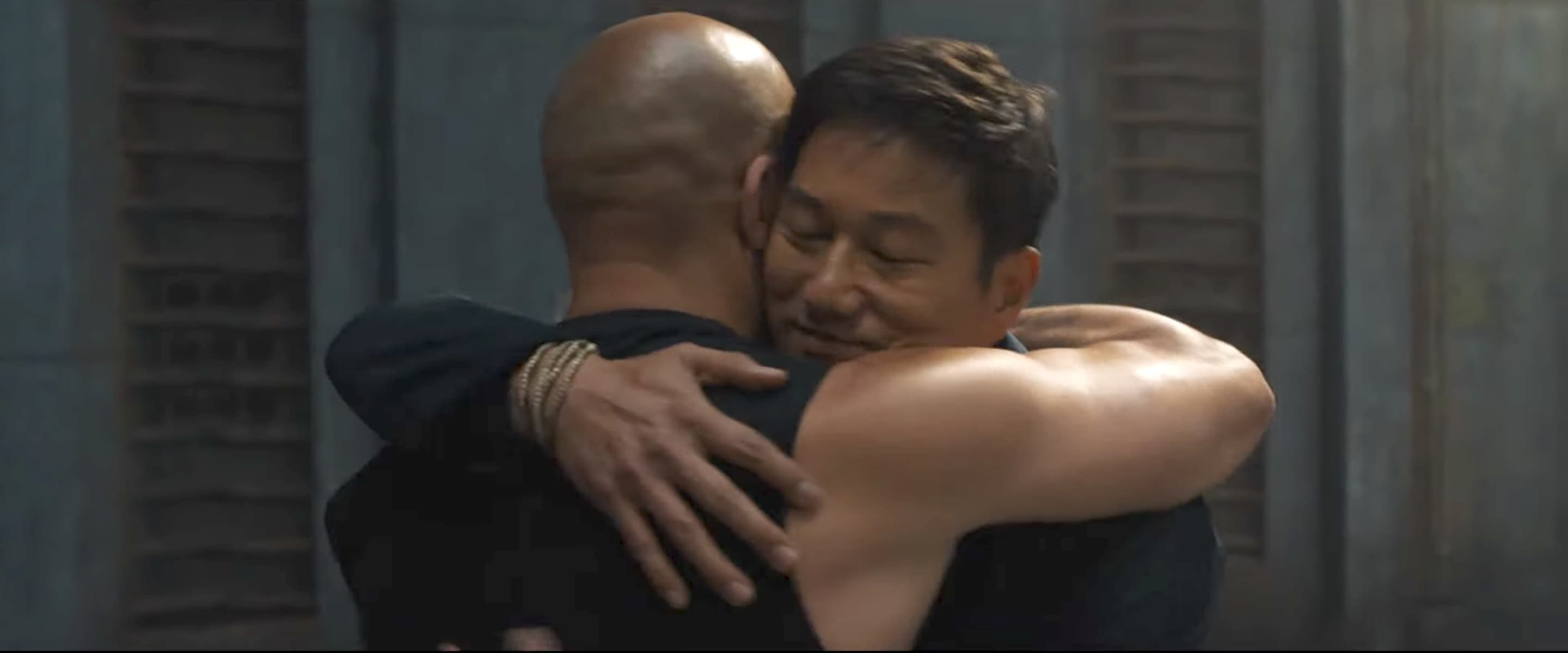(#2) The Favourite
- Olivia Colman, Emma Stone, Rachel Weisz, Nicholas Hoult, Joe Alwyn, Mark Gatiss
The Favourite (2018), starring Olivia Colman and Emma Stone, is a story set in 18th-century England in which two women compete for the favor of Queen Anne.
Illness: Gout
How it is portrayed: Gout, also referred to as "the disease of kings," is an arthritis-like inflammatory disease that impairs the joints caused by consuming foods high in fat. A poor diet and obesity can lead to the buildup of uric acid in the body, resulting in excruciating pain in the limbs. As portrayed in the movie, the queen was known to have suffered from this disease for much of her life, in addition to other ailments. Both the symptoms of the disease and its appearance on Anne's body in the film appear to be accurate, as were the treatments used, including the herbs gathered by Stone’s character in an effort to ease the queen's pain.
(#8) Breathe
- Andrew Garfield, Claire Foy, Hugh Bonneville, Tom Hollander, Ed Speleers, Dean-Charles Chapman
Breathe (2017), based on the experiences of one of its producer's parents, dramatizes the life of Robin Cavendish as he and his family adapt to the reality of his polio diagnosis at the age of 28.
Illness: Polio
How it is portrayed: The film took more than seven years to write due to busy schedules and detailed feedback loops between producer Jon Cavendish and writer William Nicholson. As a result, the finished product achieved a high level of accuracy not only in its depiction of how the Cavendish family impacted the social and political perception of polio in the 1950s (particularly with their invention of a wheelchair with a built-in respirator), but in the pessimism and isolation often encountered by those with polio and other disabilities of the era.
(#5) Little Women
- Saoirse Ronan, Laura Dern, Emma Watson, Florence Pugh, Eliza Scanlen, Timothée Chalamet, James Norton, Louis Garrel, Meryl Streep
Greta Gerwig's Little Women (2019) is based on Louisa May Alcott's oft-adapted 1868 novel of the same name. The film tells the story of four sisters living in Massachusetts during the American Civil War era.
Illness: Scarlet fever
How it is portrayed: In the film, one of the four sisters, Beth, contracts scarlet fever when coming to the aid of a neighboring family whose child had the disease. The disease is highly contagious and results in a high fever accompanied by a skin rash and severe sore throat. Thanks to the quick care administered by her sisters, Beth recovers from her illness, but her immune system is jeopardized. As is often the case for those who manage to recover from scarlet fever, Beth's weakened immune system leaves her susceptible to other complications, which leads inexorably to her passing. Though scarlet fever is now treatable, at the time the film takes place, the mortality rate was particularly high.
(#11) The Theory of Everything
- Eddie Redmayne, Felicity Jones, Harry Lloyd, Emily Watson, David Thewlis, Charlie Cox, Charlotte Hope, Enzo Cilenti, Simon McBurney, Adam Godley, Simon Chandler, Christian McKay, Thomas Morrison, Georg Nikoloff, Alice Orr-Ewing, Guy Oliver-Watts, Michael Marcus, Brett Brown , Tom Prior, Gruffudd Glyn
The Theory of Everything (2014) depicts the life of Stephen Hawking, adapted from the book written by his ex-wife, Jane. The film covers Hawking's life pre- and post-ALS diagnosis, and depicts the ways in which he and his family adapt to the progression of the disease.
Illness: Amyotrophic lateral sclerosis (ALS)
How it is portrayed: ALS targets the brain's motor neurons, which are responsible for moving all the different muscles in the body. During production, Hawking was consulted, and he gave his signature of approval upon completion. The film has received applause throughout the ALS community for the detail and dedication with which the part of Hawking was played by Eddie Redmayne. One criticism the film received was in regard to its portrayal of the disease’s impact on walking. In the film, Hawking's gait has a pigeon-toe movement, while in reality, "walking is much more hesitant, imbalanced, and limb dragging."
(#9) The Painted Veil
- Naomi Watts, Edward Norton, Liev Schreiber, Diana Rigg, Sally Hawkins, Toby Jones, Anthony Wong, Zoe Telford, Alan David, Yu Xia, Juliet Howland, Gesang Meiduo, Cheng Shihan, Marie-Laure Descoureaux, Catherine An
The Painted Veil (2006), based on the 1925 novel by W. Somerset Maugham, follows a recently wed couple, Walter and Kitty, who travel to Shanghai, where Walter works studying infectious diseases, specifically a cholera outbreak.
Illness: Cholera
How it is portrayed: Cholera, a highly contagious disease spread largely through tainted water sources causing severe dehydration and sometimes loss of life, is a plot-driving force in the film. The film has been lauded for the way it portrays the effects of the disease as it ravages a rural Chinese town, with "harrowing scenes of how cholera affects its victims and the depressing effect on the rest of the community." Additionally, it accurately portrays the common cure for the spread of the disease, which is the identification and isolation of the compromised water source.
(#6) The Elephant Man
- Anthony Hopkins, John Hurt, Anne Bancroft, John Gielgud, Wendy Hiller, Kenny Baker, Freddie Jones, Michael Elphick, Patricia Hodge, Kathleen Byron, Lesley Dunlop, Dexter Fletcher, William Morgan Sheppard, Harry Fielder, Phoebe Nicholls, John Standing, David Ryall, Hannah Gordon, Pauline Quirke, Claire Davenport, Nula Conwell, Carol Harrison, Helen Ryan, Ralph Morse, Frederick Treves, Hugh Manning, Patsy Smart, Roy Evans, Deirdre Costello, Fanny Carby, Marcus Powell, Eiji Kusuhara, Norman Gay, Pat Gorman, Gerald Case, Hugh Spight, Tommy Wright, Eric Bergren, Tony London, Christopher Greener, Robert Lewis Bush, Brenda Kempner, Richard Hunter, Janie Kells, Peter Davidson, Teresa Codling, Dennis Burgess, Christopher De Vore, Bernadette Milnes, Joan Rhodes, Alfie Curtis, Adam Caine, Gilda Cohen, Stromboli, Victor Kravchenko, James Cormack, Kevin Schumm, Beryl Hicks, Penny Wright, Marion Betzold, Robert Day, Caroline Haigh, Florenzio Morgado, Michele Amas, Fred Wood, Orla Pederson, Lesley Scoble, Teri Scoble, Lydia Lisle, John Rapley, Lucie Alford
The Elephant Man (1980) is based on the true story of Joseph Merrick, a man who lived in London during the late 1800s and suffered from a physical deformity believed to have been undiagnosed Proteus syndrome.
Illness: Severe deformity, possibly Proteus syndrome
How it is portrayed: The deformity suffered by Merrick during his life appears to be correctly portrayed throughout the film, as his ailment resulted in his being forced into a life as a sideshow attraction. The film shows him sleeping sitting in a chair with his head resting on his knees, which is believed to have been necessary for Merrick so that the weight and size of his head wouldn't asphyxiate him. Additionally, his passing in the film is consistent with Merrick's presumed cause of death - spinal dislocation and/or asphyxiation.
New Random Displays Display All By Ranking
About This Tool
Every time the virus comes, people always have to face multiple questions about survival and death, freedom and order, goodness, and evil. These movies that accurately record history are like a mirror, vividly recording disasters, restoring reality, and seeing people's hearts. The historical illnesses have shown human ignorance and fear. There are countless accurate movies that always show us familiar doomsday scenes, full of complex and contradictory clues.
The virus will eventually be defeated, and then forgotten in time, until the next disaster knocks on the door. It is a great time to watch 13 accurate movies about historical illnesses, do not be afraid, everything will be better. And It is a useful random tool for people who like to search for interesting things.
Our data comes from Ranker, If you want to participate in the ranking of items displayed on this page, please click here.
















